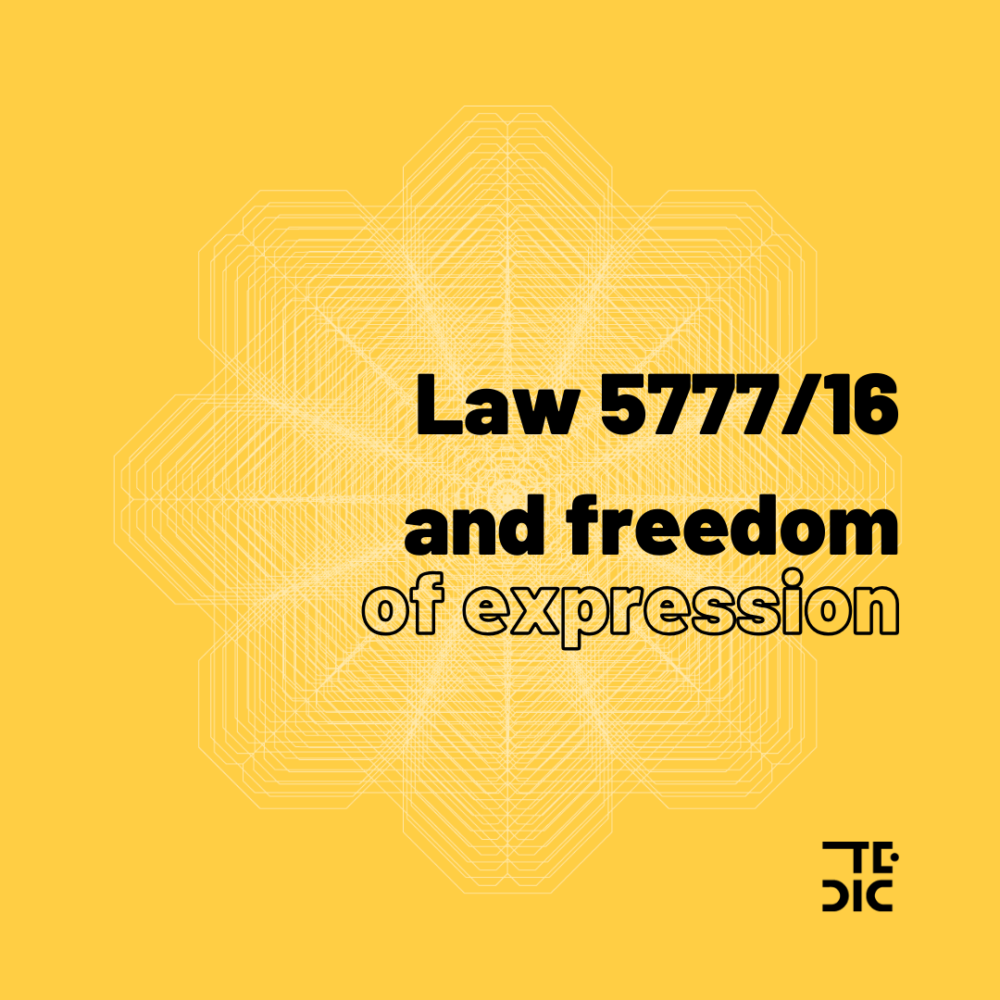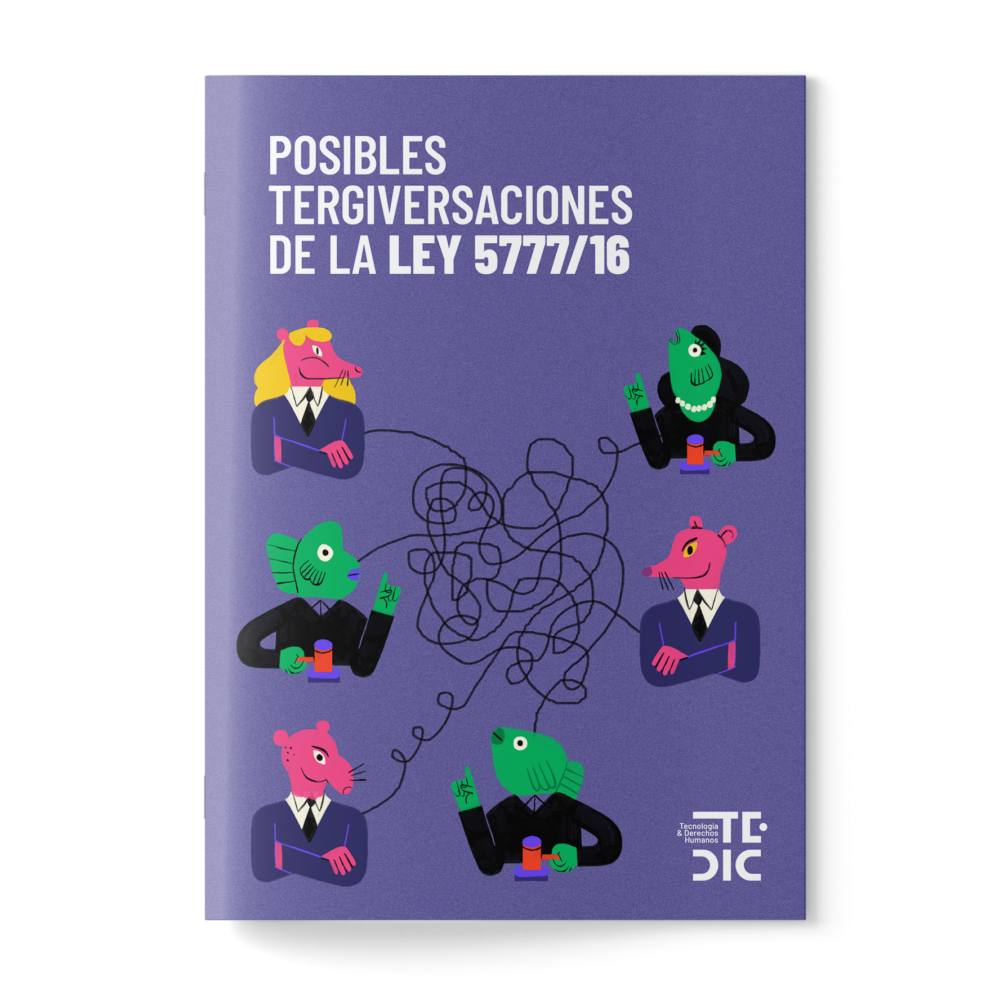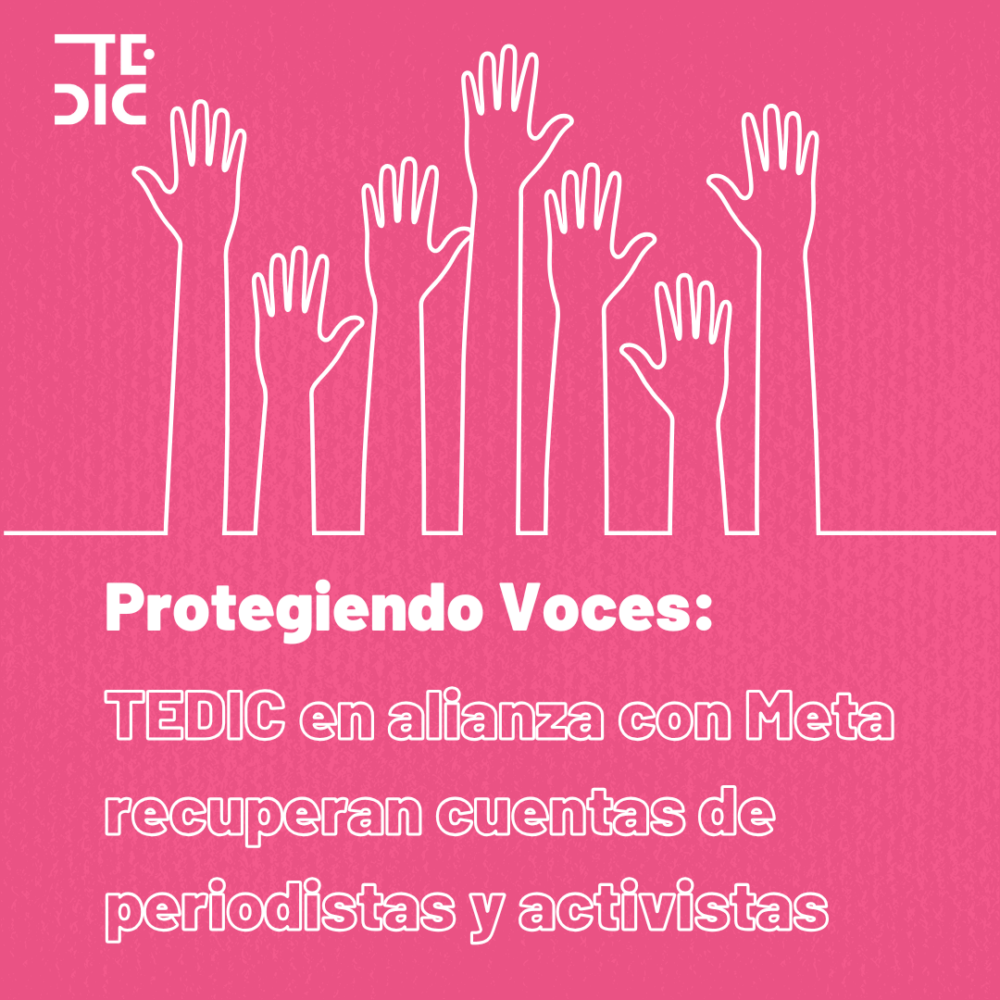
Misapplication of the law preventing violence against women in Paraguay puts freedom of speech at risk in the country
Since 2023, it has been documented that Justice of the Peace Courts in Paraguay are issuing controversial rulings that affect the public interest regarding the application of law 5777/16 “On the comprehensive protection of women, against all forms of violence“. From TEDIC and CELE we have analyzed 6 lawsuits that affect the freedom of speech and press in the country and are worrying because they distort the objective of the law that seeks to protect women1.
The six cases correspond to journalists and congresswomen who have made publications referring to corruption cases through investigative journalism and publications of parody and satire against women who hold public office or who are public people.
The first case involves journalist Mabel Portillo, who, in one of her publications, put under scrutiny the management of municipal funds by the mayor of Yataity, Gloria Duarte, specifically in relation to the reconstruction of a retaining wall that was damaged by the rains. That publication caused a series of legal actions by the mayor, who pressed charges for violence against women, arguing that the publication constituted psychological violence under Law 5777/16. The Justice of the Peace Court’s 2023 ruling in favor of the mayor not only represented a setback for Portillo, but also triggered an act of censorship against her, even prohibiting her from communicating with the mayor, an essential tool for any journalist.
The second case is against businessman Christian Chena and the digital media Resumen de Noticias (RDN). Gisele Zuni Mousques pressed charges against Chena for violence against her, invoking law 5777/16. Judge Gloria Machuca declared him guilty for violence and imposed restrictions for him to refer to the alleged victim in his social media and other digital media. In addition, the judge emphasized the prohibition to use denigrating, aggravating, discriminatory or insulting terms that undermine the dignity and integrity of Mousques as a person and woman.
The third case analyzed concerns journalist Alfredo Guachiré. After bringing to light a complaint for alleged appropriation and fraud against the President at the time of the Sanitation Service Institution of Paraguay (ESSAP), Natalicio Chase, and his wife, Celia Galli. She pressed charges against Guachiré and the media El Independiente for violence against women. The ruling was in favor of Galli and resulted in the removal of the article from the media’s web, marking a delicate moment in the practice of journalism and freedom of speech in the country.
The fourth case corresponds to journalist Letizia Medina, where once again the use of restrictive measures to censor freedom of speech is highlighted, this time by senator Norma Aquino. After Medina parodied the senator in a video shared on social media in February 2024, the senator proposed to apply restrictive measures to remove the publication. Although there is no sentence yet, at the time of writing this article, it is expected that the ruling will avoid repeating the practices of the Justice of the Peace Courts regarding Law 5777/16, which puts at risk the exercise of freedom of speech and press.
The fifth case is against congressman Rodrigo Gamarra, facing accusations for defaming a female senator, which led her to seek restrictive measures without limiting freedom of speech. Even though Judge Analía Cibils Miñarro rejected the request for restrictive measures, she based her decision particularly on the congressman’s parliamentary immunity, without adequately considering the possible violation of freedom of speech. In addition, it is emphasized that the restrictive measures of protection are not criminal sanctions, therefore, under the interpretation of TEDIC and CELE, they cannot be protected under parliamentary immunity.
In the sixth case, there is a situation similar to the previous ones affecting journalists, as is the case of Fredy Chamorro2. The journalist, together with other colleagues, is in the crosshairs of justice after revealing irregularities in the management of the Encarnación District Hospital. After his investigation, the director of the hospital, Claudia Vega, filed a complaint for harassment and threats, which resulted in restrictive measures of censorship against Chamorro and his colleagues, who were affected by restrictions imposed by Judge Vilma Saucedo Cardozo.
Tension between Law 5777/16 and freedom of speech
Law 5777/16 represents a significant advance in the fight against gender-based violence in Paraguay by criminalizing femicide, establishing a Unified and Standardized System of Registration of Violence against Women, and defining responsibilities for various state institutions in the prevention and attention to gender-based violence. Despite these advances, there are still challenges in its effective implementation, including the lack of infrastructure and sufficient personnel in the Justice of Peace Courts, as well as the lack of training in gender perspective and human rights for law professionals.
There are several publications that expose the lack of State responses to violence and its failure to adequately protect women, which generates uncertainty and lack of effective protection for victims. It is crucial to ensure consistent and effective implementation of protection measures, with a thorough assessment of each individual situation and special attention to the needs and expectations of the victims.
However, it is observed that the restrictive measures for the protection of victims of violence applied to remove or prohibit publication in social media and on the Internet in general by the alleged aggressor, raises questions in relation to constitutional and international precepts of freedom of speech, since it can be interpreted as a form of prior censorship. This kind of abusive use of this type of legal framework is not exclusive to Paraguay and other countries in the region have recently seen the generic invocation of laws on gender violence to censor critical points of view of powerful sectors.
In the cases studied, it is observed that the Justice of the Peace Courts apply the procedural legislation 1600/00 of law 5777/16 with the main purpose of guaranteeing the removal of the violent person from the home as an extreme measure. They generally use subsection F of article 2 of law 1600/00 of this law grants the Judge of the Peace Court a wide discretion by allowing him/her to apply “any other measure he/she considers pertinent”. The complexity arises when the women in the cases mentioned claim to be victims of telematic or media violence, i.e., through media such as social networks and messaging. In these cases, it was possible to verify that the judges of the peace courts use clause F to apply the criterion of “any other measure deemed necessary” to prevent these women from being subjected to verbal offenses or aggressions by journalists.
In all these cases, there is a worrying trend of using Law 5777/16 in a distorted manner to restrict freedom of speech and silence journalists and individuals in general. The lack of a rigorous analysis from a human rights perspective raises serious concerns about respect for this fundamental right in Paraguay. The situation is particularly serious because gender-based violence is one of the most crucial problems that our communities face, and the existence of adequate legal frameworks to fight this phenomenon is imperative. The abuse of these legal frameworks for spurious purposes such as those mentioned here represent a double problem: because of the impact of these abuses on freedom of speech and because they weaken necessary laws and make women vulnerable to opportunistic and conservative attacks.
Prior Censorship in International and Constitutional Law
Before delving into the analysis of the six cases that show the threat to the fundamental right of freedom of speech, it is imperative to recall the definitions and due processes that regulate the restriction of fundamental rights under international law, as well as what is established in the National Constitution of Paraguay. It is essential to understand these legal and procedural frameworks in order to properly assess the applicability of restrictive measures in each particular situation and thus guarantee the respect and protection of individual rights in a democratic context.
Freedom of speech is a fundamental human right that allows every person to express his or her ideas, opinions and beliefs without fear of reprisal or censorship. This principle is essential in democratic societies, fostering the open exchange of information, public debate and social progress. However, this right is not absolute and may have legitimate limits in cases of hate speech, defamation or incitement to violence.
An important aspect is the recognized dual dimension of this right1 , which protects both individual rights of speech and the democratic functioning of society as a whole. This means that everyone has the right to express his or her views and to hear and understand the views of others2. Therefore, any State action that affects an individual’s freedom of speech also impacts the recipient’s social right to receive information and learn about different points of view3.
In the digital sphere, resolving conflicts of rights requires applying criteria of legitimacy and weighing various factors. Freedom of speech, as a fundamental pillar in a democratic society, protects and guarantees other human rights, but it is not absolute and may have limitations. These restrictions must meet specific requirements, established by bodies of the Inter-American system for the protection of human rights, to be considered legitimate, as in the case of the application of the tripartite test.
The fundamental requirements for any restriction to the right to freedom of speech must meet this test, under the premise that it must comply with the principle of legality, imperative purpose, necessity, appropriateness and proportionality of the measure, legal guarantees and compliance with due process. The application of international standards to the digital environment presents challenges, especially in conflicts between freedom of speech and other rights, such as the right to honor, privacy or copyright. The adaptation of these standards to the specific conditions of the Internet is crucial, especially in issues of violence against vulnerable and minority groups.
On the other hand, it is important to highlight that the Inter-American doctrine identifies three main types of specially protected speech: political, on matters of public interest and on public figures4. In a democratic society, public debate on political issues and general interests limits legitimate restrictions on political criticism and expressions related to matters of public interest. Freedom of speech in these areas is essential for the healthy functioning of democracy.
In the same line, the expressions are directed to public officials, persons voluntarily involved in public affairs or candidates for public office, a higher threshold of tolerance for criticism is established5. These individuals are subject to more intense public scrutiny6, and the State has an obligation to refrain from imposing restrictions on the exercise of the right of speech in this context. This scrutiny functions as an accountability mechanism, an integral part of democratic control, supported by the obligation of transparency in the actions of the State.
Political humor, through satire and parody, has also been a traditional tool for denouncing social issues1. Although these expressions are protected by freedom of speech, they must respect the rights and reputation of third parties, as well as the norms of national security and public morality. The Inter-American Court has recognized the importance of humor as part of freedom of speech, although it has not yet dealt with specific cases related to this issue.
With regard to prior censorship, the Convention prohibits censorship of the dissemination of information or expressions prior to publication and is considered a serious violation of this right. The Inter-American Court has emphasized that prior censorship radically violates freedom of speech and negatively affects democracy. Freedom of speech in Paraguay is guaranteed by constitutional article 26, which also explicitly prohibits prior censorship and emphasizes the importance of guaranteeing full freedom of speech as a fundamental element for the democratic functioning of the country. However, challenges persist in the effective implementation of the law for the comprehensive protection of women against all forms of violence.
Therefore, it can be preliminarily stated that the six cases analyzed highlight the need to safeguard the fundamental right to freedom of speech in Paraguay, especially when it comes to the scrutiny of public officials and public figures. The mayor, the director of the hospital, the congresswomen, by occupying a relevant political position, or in the case of the wives of politicians who are also considered public figures, are subject to a higher level of scrutiny by society and the media. However, in the Justice of Peace courts’ rulings, it is noted that the tripartite test for assessing the legitimacy of restrictions on freedom of speech was not adequately applied, raising concerns about the respect for this right. This shortcoming in the legal analysis should be corrected by higher courts when reviewing these decisions. Restricting the ability of journalists to report on matters of public interest undermines freedom of the press and the public’s right to access truthful and relevant information. It is therefore crucial that the courts promote an environment conducive to the independent practice of journalism, avoiding any form of legal intimidation that may undermine this fundamental right.
This same statement applies to cases of satire, parody and caricature, which are legally protected, as long as they do not cross certain legal boundaries. These expressions, including political criticism directed to public officials or public figures, are supported by freedom of speech, as long as they do not incite hatred or other unprotected speech recognized by law. Ultimately, preserving an environment where criticism and debate can flourish is crucial to maintaining an informed and participatory democratic society.
Therefore, the need for a detailed analysis of each case is highlighted in order to apply Law 5777/16 and Law 1600/00 in line with the American Convention and the Constitution. In addition, the importance of balancing the protection of individual rights with the promotion of gender equality and respect for freedom of speech in public policies is highly stressed.
Next steps
TEDIC with the collaboration and editing of CELE, will publish a study that examines in detail each of the above cases, providing contextualized analysis and recommendations to ensure respect for fundamental rights, including freedom of speech.
In addition, TEDIC and CELE will act as amicus curiae in the case of Cristian Chena and the digital media RDN, providing strategic legal support to defend freedom of speech and access to truthful information and join the defense. Through strategic litigation, they will seek to help set strong legal precedents that protect these fundamental rights in the digital sphere and in society in general. This commitment reflects the continued efforts of both organizations to promote justice and the defense of human rights in Paraguay.
1 This case was reported by the Journalists Security Roundtable of Paraguay. Web page: https://seguridadperiodistas.org.py/
2 The Union of Paraguayan Journalists and digital media have also presented their concerns in this regard. February 2024. Available in: https://www.infobae.com/america/agencias/2024/02/13/periodistas-paraguayos-denuncian-censura-por-mal-uso-de-una-ley-que-protege-a-la-mujer/
3 Case Herrera Ulloa vs. Costa Rica. Preliminary Objections, Merits, Reparations and Costs. Sentence of 2 July, 2004.
4 Case Ricardo Canese vs. Paraguay. Merits, Reparations and Costs. Sentence of 31 August, 2004.
5 IACHR. Case Ivcher Bronstein vs. Perú. Repairs and Costs. Sentence of 6 February, 2001.
6 United Nations (UN) Special Rapporteur on the Promotion and Protection of the Right to Freedom of Opinion and Expression, Representative on Freedom of the Media of the Organization for Security and Cooperation in Europe (OSCE), Organization of American States (OAS) Special Rapporteur on Freedom of Expression, and Special Rapporteur on Freedom of Expression and Access to Information of the African Commission on Human and Peoples’ Rights (ACHPR). June 1, 2011. Joint Declaration on Freedom of Expression and the Internet.
7 IACHR, Case Kimel Vs. Argentina. Sentence of 2 May, 2008; IACHR, Case Palamara Iribarne Vs. Chile. Sentence of 22 November, 2005.
8 Case Herrera Ulloa vs. Costa Rica. Preliminary Objections, Merits, Reparations and Costs. Sentence of 2 July, 2004.
9 Case “The Last Temptation of Christ” (Olmedo Bustos and others) Vs. Chile. Sentence of 5 February, 2001.

 [Research] Technology-facilitated gender-based violence against women politicians in Paraguay
[Research] Technology-facilitated gender-based violence against women politicians in Paraguay  [Research] Possible distortions of law 5777/16: Study of 6 legal cases
[Research] Possible distortions of law 5777/16: Study of 6 legal cases  Defending those who defend us
Defending those who defend us